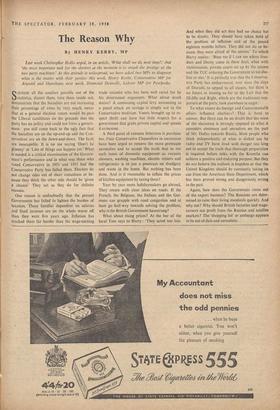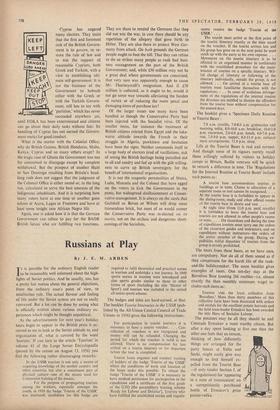The Reason Why
By HENRY KERBY, MP Last week Christopher Hollis urged, in an article, 'What shall we do next titne?,' that 'the most important task for the electors at the moment is to smash the prestige of the two party machines.' As this attitude is widespread, 'we have asked Iwo MPs to diagnose what is the matter with their parties: this week, Henry Kerby, Conservative MP for Arundel and Shoreham; next week, Desmond Donnelly, Labour MP for Pembroke.
QUEEZE all the comfort possible out of the 1.3 statistics, distort them, turn thein inside out, demonstrate that the Socialists are not increasing their percentage of votes, by very much, swear that at a general election voters would by-pass the Liberal candidates on the grounds that the party has no policy and could not form a govern- ment: you still come back to the ugly fact that the SOcialists are on the up-and-up and the Con- servatives are on the down-and-down. The facts are inescapable. It is no use saying 'Don't be gloomy' or 'Lots of things can happen yet.' What is needed is a critical examination of the Govern- ment's performance and in what way those who voted Conservative in 1951 and 1955 feel the Conservative Party has failed them. Electors do not change sides out of sheer cussedness or be- cause they think the other side should be 'given a chance.' They act as they do for ' definite reasons.
One reason is undoubtedly that the present Government has failed to lighten the burden of taxation: Those families dependent on salaries and fixed incomes are on the whole worse of than they were five years ago. Inflation has cracked them far harder than the wage-earning trade unionist who has been well cared for by his determined organisers. What about death duties? A continuing capital levy amounting to a penal attack on savings is simply not in the Conservative tradition. Voters brought up to re- spect thrift can have but little respect for a government that grabs private capital and spends it as income.
A third point of extreme bitterness is purchase tax. Four Conservative Chancellors in succession have been urged to remove the more grotesque anomalies and to accept the truth that to tax such items of domestic equipment as vacuum cleaners, washing machines, electtic mixers and refrigerators is to put a premium' on 'drudgery and waste in the home. But nothing. has been done. And is it reasonable to inflate the prices of kitchen equipment by taxing them?
Year by year more holidaymakers go abroad. They return with clear ideas on roads. If the French, the Belgians, the Italians and the Ger- mans can grapple with road congestion and at least go half-way towards solving the problem, why is the British Government hamstrung?
What about rising prices? At the bar of the local Tom says to Harry : 'They acted too late. And when they did act they had no choice but to be drastic. They should have taken hold of the problem of inflation and of the pound eighteen months before. They did not do so be- cause they were afraid of the unions.' To which Harry replies : 'Bless me if I can see where free- dom and liberty come in these days, what with victimisation, private courts set up by the unions and the TUC ordering the Government to toe-the- line or else.' It is perfectly true that the Conserva- tive Party has endeavoured, ever since the days of Disraeli, to appeal to all classes, but there is no future in leaning so far to the Left that the Middle and Right, which are the traditional sup- porters of the party, look elsewhere in anger.
• To what extent do foreign and Commonwealth affairs influence elections? - That is hard to answer. But there can be no doubt that the mass of the electorate is strongly opposed to what it considers obstinacy and unrealism on the part of M. Dulles towards Russia. Most people who think independently of what is dished out by radio and TV have lived with danger too long not to accept the truth that thorough preparation is required before talks with the Kremlin can achieve a positive and enduring purpose. But they do not believe the outlook is hopeless or that the United Kingdom should be constantly taking its cue from the American State Department, which has been proved wrong and dangerously wrong in the past.
Again, how does the Government come out of the export business? The Russians are deter- mined to raise their living standards quickly. And why not? Why should British factories and wage- earners not profit from the Russian and satellite markets? The 'shopping list' or embargo appears to be out of date and unrealistic. What is the matter with the Colonial Office; why do British Guiana, British Honduras, Malta, Kenya, Cyprus and so many others erupt? In the tragic case of Ghana the Government was too far committed to disengage except by complete withdrawal. But the prospect of another Haiti or San Domingo resulting from Britain's head- long rush does not suggest that the judgment of the Colonial Office is either sound or, in the long run, calculated to serve the best interests of the indigenous inhabitants. And it is surprising how many voters have at one time or another gone ashore at Accra, Lagos or Freetown and have at least some insight into African Negro life.
Again, one is asked how it is that the German Government can refuse to pay for the BAOR
British forces who are fulfilling two functions.
They are there to remind the Germans that they did not win the war, in case there should be any repetition of the allegory that gave birth to Hitler. They are also there to protect West Ger- many from attack. On both grounds the German people ought to foot the bill. That they can refuse to do so strikes many people as rank bad busi- ness management on the part of the British Government; and, while £50 million may not be a great deal where governments are concerned, that very sum was apparently enough to cause Mr. Thorneycroft's resignation. And if £50 million is collected, as it ought to be, .would it not go some way towards alleviating the burden of surtax or of reducing the more penal and damaging items of purchase tax?
Of the larger issues too many have been handled as though the Conservative Party had been injected with the Socialist virus. Of the smaller items, for instance the treatment of British citizens evicted from Egypt and the luke- warm attitude towards the French in their struggle in Algeria, pawkiness and hesitation have been the signs. Neither commends itself to a large body of electors tired of vacillations, sick of seeing the British heritage being parcelled out to all and sundry and fed up with the glib willing- ness to carve up British sovereignty for the benefit of 'international' organisations.
It is -not the magnetic personalities of Moira, Ludo, Manuela and the Colonel that have egged on the voters to kick the Government in the pants, but widespread disillusionment at Conser- vative management. It is always on the cards that Gaitskell or Bevan or Wilson will drop some tremendous brick, but most of us would sooner the Conservative Party was re-elected on its merits, not on the archaic and dangerous short- comings of the Socialists.



































 Previous page
Previous page